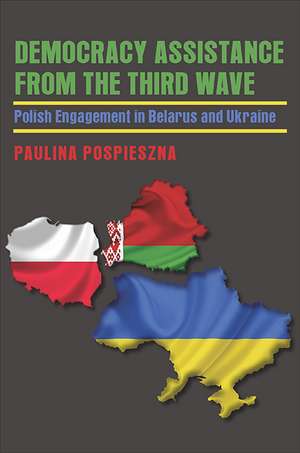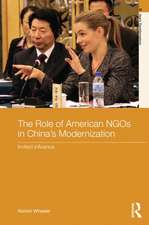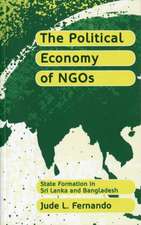Democracy Assistance from the Third Wave: Polish Engagement in Belarus and Ukraine: Russian and East European Studies
Autor Paulina Pospiesznaen Limba Engleză Paperback – 28 feb 2014
The role of Western NGOs in the transition of postcommunist nations to democracy has been well documented. In this study, Paulina Pospieszna follows a different trajectory, examining the role of a former aid recipient (Poland), newly democratic itself, and its efforts to aid democratic transitions in the neighboring states of Belarus and Ukraine.
Belarus is widely regarded as the most authoritarian state in the region, while Ukraine is witnessing a slow, if often troubled, democratic consolidation. Each state presents a different set of challenges to outside agencies. As Pospieszna shows, Poland is uniquely positioned to offer effective counsel on the transition to democracy. With similarities of language and culture, and a shared history, combined with strong civic activism and success within the European Union, Poland’s regional policies have successfully combined its need for security and a motivation to spread democracy as primary concerns. Pospieszna details the founding, internal workings, goals, and methods of Poland’s aid programs. She then compares the relative degrees of success of each in Belarus and Ukraine and documents the work yet to be done.
As her theoretical basis, Pospieszna analyzes current thinking on the methods and effectiveness of NGOs in transitions to democracy, particularly U.S.- and European-led aid efforts. She then views the applicability of these methods to the case of Poland and its aid recipients. Overwhelmingly, Pospieszna finds the greatest success in developmental programs targeting civil society—workers, intellectuals, teachers, students, and other NGO actors.
Through extensive interviews with government administrators and NGO workers in Poland and the United States, coupled with archival research, Pospieszna assembles an original perspective on the mitigation of the ‘postcommunist divide’. Her work will serve as a model for students and scholars of states in transition, and it provides an overview of both successful and unsuccessful strategies employed by NGOs in democracy assistance.
Belarus is widely regarded as the most authoritarian state in the region, while Ukraine is witnessing a slow, if often troubled, democratic consolidation. Each state presents a different set of challenges to outside agencies. As Pospieszna shows, Poland is uniquely positioned to offer effective counsel on the transition to democracy. With similarities of language and culture, and a shared history, combined with strong civic activism and success within the European Union, Poland’s regional policies have successfully combined its need for security and a motivation to spread democracy as primary concerns. Pospieszna details the founding, internal workings, goals, and methods of Poland’s aid programs. She then compares the relative degrees of success of each in Belarus and Ukraine and documents the work yet to be done.
As her theoretical basis, Pospieszna analyzes current thinking on the methods and effectiveness of NGOs in transitions to democracy, particularly U.S.- and European-led aid efforts. She then views the applicability of these methods to the case of Poland and its aid recipients. Overwhelmingly, Pospieszna finds the greatest success in developmental programs targeting civil society—workers, intellectuals, teachers, students, and other NGO actors.
Through extensive interviews with government administrators and NGO workers in Poland and the United States, coupled with archival research, Pospieszna assembles an original perspective on the mitigation of the ‘postcommunist divide’. Her work will serve as a model for students and scholars of states in transition, and it provides an overview of both successful and unsuccessful strategies employed by NGOs in democracy assistance.
Din seria Russian and East European Studies
-
 Preț: 422.97 lei
Preț: 422.97 lei -
 Preț: 402.44 lei
Preț: 402.44 lei -
 Preț: 141.48 lei
Preț: 141.48 lei -
 Preț: 428.75 lei
Preț: 428.75 lei - 15%
 Preț: 678.74 lei
Preț: 678.74 lei -
 Preț: 433.53 lei
Preț: 433.53 lei -
 Preț: 238.43 lei
Preț: 238.43 lei -
 Preț: 388.79 lei
Preț: 388.79 lei -
 Preț: 436.25 lei
Preț: 436.25 lei -
 Preț: 295.91 lei
Preț: 295.91 lei -
 Preț: 326.41 lei
Preț: 326.41 lei -
 Preț: 127.24 lei
Preț: 127.24 lei -
 Preț: 123.55 lei
Preț: 123.55 lei -
 Preț: 315.41 lei
Preț: 315.41 lei -
 Preț: 171.58 lei
Preț: 171.58 lei -
 Preț: 485.99 lei
Preț: 485.99 lei - 15%
 Preț: 493.66 lei
Preț: 493.66 lei -
 Preț: 474.45 lei
Preț: 474.45 lei -
 Preț: 391.67 lei
Preț: 391.67 lei -
 Preț: 502.16 lei
Preț: 502.16 lei -
 Preț: 431.62 lei
Preț: 431.62 lei -
 Preț: 113.42 lei
Preț: 113.42 lei -
 Preț: 422.00 lei
Preț: 422.00 lei -
 Preț: 395.54 lei
Preț: 395.54 lei -
 Preț: 179.30 lei
Preț: 179.30 lei -
 Preț: 397.45 lei
Preț: 397.45 lei -
 Preț: 470.60 lei
Preț: 470.60 lei -
 Preț: 363.26 lei
Preț: 363.26 lei -
 Preț: 461.94 lei
Preț: 461.94 lei -
 Preț: 352.86 lei
Preț: 352.86 lei -
 Preț: 272.52 lei
Preț: 272.52 lei -
 Preț: 349.81 lei
Preț: 349.81 lei -
 Preț: 184.58 lei
Preț: 184.58 lei -
 Preț: 317.63 lei
Preț: 317.63 lei -
 Preț: 468.65 lei
Preț: 468.65 lei -
 Preț: 432.57 lei
Preț: 432.57 lei -
 Preț: 182.40 lei
Preț: 182.40 lei -
 Preț: 389.76 lei
Preț: 389.76 lei -
 Preț: 426.63 lei
Preț: 426.63 lei -
 Preț: 465.76 lei
Preț: 465.76 lei -
 Preț: 126.00 lei
Preț: 126.00 lei -
 Preț: 283.50 lei
Preț: 283.50 lei -
 Preț: 403.43 lei
Preț: 403.43 lei - 23%
 Preț: 568.69 lei
Preț: 568.69 lei - 23%
 Preț: 565.89 lei
Preț: 565.89 lei - 23%
 Preț: 556.25 lei
Preț: 556.25 lei -
 Preț: 385.91 lei
Preț: 385.91 lei -
 Preț: 422.97 lei
Preț: 422.97 lei -
 Preț: 385.53 lei
Preț: 385.53 lei -
 Preț: 423.35 lei
Preț: 423.35 lei
Preț: 421.03 lei
Nou
Puncte Express: 632
Preț estimativ în valută:
80.57€ • 83.24$ • 67.06£
80.57€ • 83.24$ • 67.06£
Carte tipărită la comandă
Livrare economică 26 martie-09 aprilie
Preluare comenzi: 021 569.72.76
Specificații
ISBN-13: 9780822962717
ISBN-10: 0822962713
Pagini: 368
Dimensiuni: 156 x 235 x 18 mm
Greutate: 0.41 kg
Ediția:1
Editura: University of Pittsburgh Press
Colecția University of Pittsburgh Press
Seria Russian and East European Studies
ISBN-10: 0822962713
Pagini: 368
Dimensiuni: 156 x 235 x 18 mm
Greutate: 0.41 kg
Ediția:1
Editura: University of Pittsburgh Press
Colecția University of Pittsburgh Press
Seria Russian and East European Studies
Recenzii
“An important book. . . . Well-written and readable, the book will appeal to specialists in foreign aid and in East European area studies.”
—Choice
—Choice
“A well-written and very informative book, which contributes not only to the field of Eastern European studies, but also to the entire body of research on democratization.”
—Europe-Asia Studies
—Europe-Asia Studies
“Democracy Assistance from the Third Wave examines Poland’s democracy assistance programs to the neighboring states of Ukraine and Belarus. It is based on Pospieszna’s thorough reading of the secondary literature, archival research, and interviews with several dozen state officials and NGO professionals. Its contribution and novelty lies in the fact that it delves deeply into something not examined before, a democracy assistance program by a new democracy.”
—Michael Bernhard, University of Florida
“A valuable case study of how new actors in international democracy support are approaching their work. Systematically probing the motivations, methods, and results of Poland’s efforts to foster democracy in Belarus and Ukraine, Pospieszna not only illuminates Poland’s democracy assistance but also provides a framework for analyzing the work of other emerging actors in this domain.”
—Thomas Carothers, Carnegie Endowment for International Peace
—Thomas Carothers, Carnegie Endowment for International Peace
Notă biografică
Paulina Pospieszna is a postdoctoral fellow at the University of Mannheim, Germany.
Descriere
The role of Western NGOs in the transition of postcommunist nations to democracy has been well documented. In this study, Paulina Pospieszna follows a different trajectory, examining the role of a former aid recipient (Poland), newly democratic itself, and its efforts to aid democratic transitions in the neighboring states of Belarus and Ukraine.
















